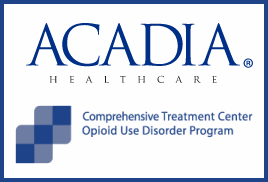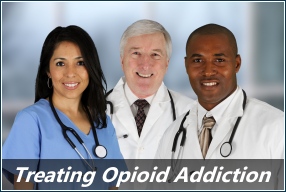 Acadia Healthcare is one of America’s leading psychiatric and chemical dependency treatment providers. Headquartered in Franklin Tennessee, the company operates an extensive network of behavioral health facilities many of which focus specifically on the treatment of opioid use disorder.
Acadia Healthcare is one of America’s leading psychiatric and chemical dependency treatment providers. Headquartered in Franklin Tennessee, the company operates an extensive network of behavioral health facilities many of which focus specifically on the treatment of opioid use disorder.
Acadia’s CTC (Comprehensive Treatment Center) clinics specialize in helping patients who are struggling with an opioid addiction. Across Acadia’s network the company employees over 20,000 staff who serve about 70,000 patients on a daily basis.
Acadia’s dedicated CTC clinics utilize the best practice medication-assisted treatment (MAT) model which aims to stabilize patients using FDA-approved medications. These medications include methadone, buprenorphine, suboxone, and vivitrol.
Medication management allows Acadia patients to successfully ease their distressing withdrawal symptoms such that long-lasting addiction recovery can be established.
Because addiction can be a very individualized experience from one person to the next, Acadia’s treatment staff strive to individualize each patient’s treatment plan in a commitment to help each person meet their personal recovery goals.
Featured here on Methadone.US are 148 CTC clinics that Acadia provide across the United States. Feel free to browse Acadia’s network to locate a treatment facility near you, and make a new start! A great quote that we believe in goes like this “Today is the first day of the rest of your life”.

 It’s no secret that many addicted people resist recovery or treatment, sometimes for years, before eventually deciding to make a change. The mental stress of addiction often paralyzes a person with fear and indecision.
It’s no secret that many addicted people resist recovery or treatment, sometimes for years, before eventually deciding to make a change. The mental stress of addiction often paralyzes a person with fear and indecision.  While it is fairly common knowledge these days, it bears repeating that fentanyl is leading to dramatic increases in drug overdose deaths. The Families Against Fentanyl group, using three years of CDC mortality data, recently concluded that fentanyl overdose had caused more deaths than the corona virus, automobile accidents, or suicide in the 18-45 age group.
While it is fairly common knowledge these days, it bears repeating that fentanyl is leading to dramatic increases in drug overdose deaths. The Families Against Fentanyl group, using three years of CDC mortality data, recently concluded that fentanyl overdose had caused more deaths than the corona virus, automobile accidents, or suicide in the 18-45 age group. The faces of recovery are as diverse as you can imagine. Decades ago, there were common stereotypes of addicts as people who looked a certain way and likely came from a shady side of the tracks.
The faces of recovery are as diverse as you can imagine. Decades ago, there were common stereotypes of addicts as people who looked a certain way and likely came from a shady side of the tracks. The science of treating opioid addiction has become increasingly popular in both medical circles and in the addiction treatment community.
The science of treating opioid addiction has become increasingly popular in both medical circles and in the addiction treatment community. 


